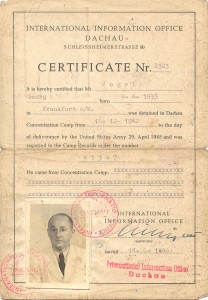(Hoffmann von Fallersleben 1798-1874)

Georg Vogel was fired from his job as assistant for the city of Frankfurt at the end of 1933 because of his anti-Nazi-attitude, which was deemed “politically unreliable”. His membership in the Jewish sports club “Bar Kochba” and his friendly relationship with Jews showed his opposition to the Nazis. He went to the Rothschild-Hospital in 1936 because a World War I injury required the amputation of his left thigh. He was well taken care of by the nurse Bertha Klein. Bertha remembered this level of trust when her husband Emil was approached by the couple Simon and Gela Saemann to look for a safe escape route along the Swiss border. Large transports disguised as evacuation departed from the Frankfurt “Großmarkthalle” (the Wholesale Market was the meeting place for the jews to be deportated) towards the Eastern countries (Poland and Russia) since May 1942. It was only a question of time before the Saemanns would also receive a deportation order. Georg Vogel expressed his willingness to hike along the Swiss border and look for an escape route. Upon his return three days later the escape plan was leaked. Georg Vogel was denounced as an escape helper and arrested on 13 October 1942. After two months in Frankfurt jails Georg Vogel, who was almost 50 years old, was transferred to the concentration camp Dachau, where he was imprisoned until the end of the war. His release document was dated 14 June 1945. Emil Klein and Simon und Gela Saemann were murdered in the concentration camp Auschwitz. Bertha Klein and her two sons were expelled to Belgium, her husband’s country of birth, and survived after being hidden separately by Belgian families.